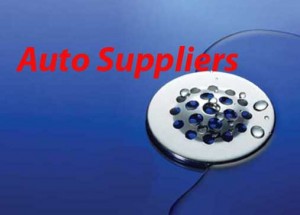
U.S. auto suppliers could be heading down the drain.
The decision by General Motors Corp. auditors to attach an adverse opinion to the company’s annual financial report – declaring last week “substantial doubt” about GM’s viability — is creating a new wave of credit problems for hard pressed suppliers across the auto industry.
There could be a slew of defaults if the auditors for suppliers dependent on GM raise similar concerns about the various partsmakers, warned Neil DeKoker, president of the Original Equipment Suppliers Association, or OESA, in an interview with TheDetroitBureau.com. An adverse auditor’s opinion usually breaches the covenants of most loan agreements, which could seriously hurt many cash-strapped suppliers.
“If the bank wants to get you off their books, they can use it against you,” said De Koker. “There are lot of banks that don’t want anything to do with automotive,” he said.
“GM auditor’s ‘going concern’ warning in the 10-K filing should not be a revelation to anyone following the company’s struggles,” said Standard & Poors analyst Efraim Levy.
The collapse of suppliers would put pressure not only on GM and Chrysler LLC, which are seeking federal aid, but also companies like Ford – which pointedly refused government assistance — and Toyota, which is now seeking help from a Japanese government-backed agency.
“If the (suppliers’) cash flow has diminished and there are no other cash sources, they will need to request support from their customer, Ford, and that will add cash pressures to Ford as well as operational risk as the companies need cash to continue to produce parts,” noted Alicia Masse, a partner in Detroit-based consulting firm BBK.
De Koker and the OESA, which represents about 65 percent of the suppliers with major contracts with American and Asian, manufacturers cars in the U.S., are hoping the U.S. Treasury will provide loans to help partsmakers through the recession.
“They’re interviewing an awful lot of people,” said De Koker, noting the U.S. Treasury officials are treating the OESA request for $18.5 billion in aid with the utmost seriousness. “But they’re being cautious. They don’t want to make the same mistakes they did with the banks,” he said.
“But it is March and we don’t want suppliers going out of business because they can’t get enough credit,” said De Koker, who warned that March is a critical month for many suppliers because production of new vehicles dropped by almost 40 percent in December, January and February. Suppliers are usually paid 30 to 45 days after delivering parts to a manufacturer. So, they’re in for some lean months, with cash flow that might not meet their minimum requirements.
Meanwhile several major suppliers reported this week they are feeling the pinch from the industry’s crisis.
Detroit-based American Axle & Manufacturing Holdings Inc. reported that the New York Stock Exchange is thinking of delisting the big automotive supplier, even as another major parts company, BorgWarner Inc., slashed its dividend.
American Axle’s market capitalization has dropped below NYSE’s continued listing standard, which requires that the average market capitalization of a listed company be not less than $75 million over a consecutive 30 trading-day period, American officials said.
AAM posted a substantial $1.2 billion loss in 2008 after a bitter labor dispute that closed its factories for 89 days last spring and then a sharp reduction in production by its principal customer, General Motors.
The NYSE also has warned that Visteon, another major supplier, could be delisted, and Southfield-based Lear Corp. has said that its outside auditors are likely to qualify is annual report with an opinion expressing doubt about its ability to continue as a going concern.
In addition, the board of directors of Auburn Hills-based BorgWarner Inc., one of the most successful suppliers in recent years, has announced the temporary suspension of the company’s 12-cent-per-share quarterly dividend.
“We are facing an unprecedented discontinuity in the marketplace,” said Timothy Manganello, BorgWarner chairman and chief executive officer.
“We continue to expect positive earnings and positive cash flow from operations for the full year 2009 based on our previously stated auto industry production assumptions,” he said.
Click here to read how Asian Automakers Spend Less to Tool Up — and how Detroit’s higher costs actually hurt suppliers.

Your article draws attention to the problem that most people do not consider when they are so quick to suggest GM should simply file for bankruptcy. GM already has every major supplier strung out about as far as they can go. If GM does go into bankruptcy, the weeks/months it will take to figure out which supplier gets paid first and how much they are due will result in a huge cascade of bankruptcies. These, in turn, will lead to parts shortages…which will lead to production shut downs…in the other car companies …which could lead to other bankruptcies.
Even Ford, which(like the one-eyed man in the land of the blind) appears to be above the fray, could be taken down by a GM bankruptcy. The complexity and fragility of this web is not at all obvious if you are not sitting in Detroit. And, unfortunately, Detroit has very little credibility these days. Hopefully your article will help Washington realize exactly what they are dealing with. I am not big on bailouts, but I am in favor of loans which will make it possible for companies like GM to restructure and emerge as a profitable business.
Bob Austin